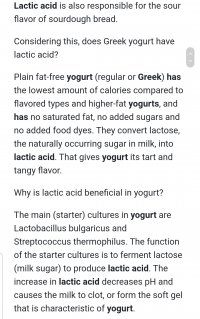How many grams of fat do you eat approximaly ,if you don't mind me asking?Thanks.I think "lowish" fat is healthier. Skin would would look awful without fats.
Navigation
Install the app
How to install the app on iOS
Follow along with the video below to see how to install our site as a web app on your home screen.
Note: This feature may not be available in some browsers.
More options
-
By using this site you agree to the terms, rules, and privacy policy.
-
Charlie's Restoration Giveaway #2 (Entire Home EMF Mitigation & Protection Along With Personal Protection) - Click Here To Enter
-
Dear Carnivore Dieters, A Muscle Meat Only Diet is Extremely Healing Because it is a Low "vitamin A" Diet. This is Why it Works so Well...
Rest the rest of this post by clicking here
-
The Forum is transitioning to a subscription-based membership model - Click Here To Read
Click Here if you want to upgrade your account
If you were able to post but cannot do so now, send an email to admin at raypeatforum dot com and include your username and we will fix that right up for you.
You are using an out of date browser. It may not display this or other websites correctly.
You should upgrade or use an alternative browser.
You should upgrade or use an alternative browser.
Big Muscles Little Fat - Lose Fat The Ray Peat Way!
- Thread starter Rinse & rePeat
- Start date
Rinse & rePeat
Member
- Joined
- Mar 10, 2021
- Messages
- 21,516
If I am inactive 50 to 70, up to 120+ if i am active.How many grams of fat do you eat approximaly ,if you don't mind me asking?Thanks.
Rinse & rePeat
Member
- Joined
- Mar 10, 2021
- Messages
- 21,516
I personally don't think too much protein will get wasted as long as it is in balance.If I am inactive 50 to 70, up to 120+ if i am active.
Rinse & rePeat
Member
- Joined
- Mar 10, 2021
- Messages
- 21,516
Lately I have been eating 3 to 4 ounces of mozzarella a day with fresh squeezed and strained oranges and it really has been much more slimming than red meat or milk. I started food logging on it to pass on the good info.How many grams of fat do you eat approximaly ,if you don't mind me asking?Thanks.
Rinse & rePeat
Member
- Joined
- Mar 10, 2021
- Messages
- 21,516
In my Lose Fat Not Pounds experiment I did eat a couple of ounces of mozzarella often. I think cheddar and other aged cheeses create histamines, which are known to create stress and weight gain in the body in excess. The same with the red meat, high in histamine hamburger does not give me the flat stomach that a fresh pan fried steak does.
Rinse & rePeat
Member
- Joined
- Mar 10, 2021
- Messages
- 21,516
The biggest indicator on how much protein I eat in a day is what the protein source is. Shrimp, has 4 grams of fat in a half pound, so I will eat a half pounding inone sitting which is 46 grams of protein,. Scallops and shrimp too, but can't eat it everyday forcheavy metal reasons and tok much zinc etc.. Red meat is not a good meat source for various reasons, cheese is too fattening to rely on it as a protein source and eggs don't have enough protein. I don't cut my protein down necessarily because I am not running around, but I would be worried if it dipped under 50 grams on a regular basis. That is why a sugar source is important, it keeps your body from breaking down your hard earned muscle when it needs an energy source.
Doc Sandoz
Member
- Joined
- Jun 21, 2020
- Messages
- 821
It is amazing how much a person needs to be "on top of it" to get 100 g protein a day without eating a lot of meat (try to keep mine under 50g). Low Fat Greek Yogurt and/or cottage cheese with added collagen is a big help (also perfect for adding CaCO2 which otherwise has to be capped up for me). I was a little worried about the yogurt, but heard Georgi say Greek has very little lactic acid. Still it has that tart yogurt taste which I always attributed to lactic acid. Wonder what gives Greek yogurt that tart flavor if not lactic acid,The biggest indicator on how much protein I eat in a day is what the protein source is. Shrimp, has 4 grams of fat in a half pound, so I will eat a half pounding inone sitting which is 46 grams of protein,. Scallops and shrimp too, but can't eat it everyday forcheavy metal reasons and tok much zinc etc.. Red meat is not a good meat source for various reasons, cheese is too fattening to rely on it as a protein source and eggs don't have enough protein. I don't cut my protein down necessarily because I am not running around, but I would be worried if it dipped under 50 grams on a regular basis. That is why a sugar source is important, it keeps your body from breaking down your hard earned muscle when it needs an energy source.
Rinse & rePeat
Member
- Joined
- Mar 10, 2021
- Messages
- 21,516
I don't find it hard to get enough protein, but rather getting it by keeping fat low is more the problem for me. Today I had my cup of coffee, then later I switched it up and had a serving of Brewer's yeast (14 grams protein). About an hour later I had 1 ounce of mozzarella (7 grams protein), some lamb gyro meat (15 grams protein), a cup of cold salted beef oxtail gelatin (10 grams protein), a Forto coffee shot (1 gram protein) and a half cup of Mexican Coke. So by noon I already had 47 grams of protein and I still feel light on my feet!It is amazing how much a person needs to be "on top of it" to get 100 g protein a day without eating a lot of meat (try to keep mine under 50g). Low Fat Greek Yogurt and/or cottage cheese with added collagen is a big help (also perfect for adding CaCO2 which otherwise has to be capped up for me). I was a little worried about the yogurt, but heard Georgi say Greek has very little lactic acid. Still it has that tart yogurt taste which I always attributed to lactic acid. Wonder what gives Greek yogurt that tart flavor if not lactic acid,
Rinse & rePeat
Member
- Joined
- Mar 10, 2021
- Messages
- 21,516
Doc Sandoz
Member
- Joined
- Jun 21, 2020
- Messages
- 821
The only suggestion I've been able to find that Greek yogurt is lower in lactic acid than regular is that what makes Greek yogurt Greek is a third straining that removes "acid whey." https://cen.acs.org/articles/95/i6/Acid-whey-waste-product-untapped.html
For those interested in further info about the difference between regular and Greek yogurt:
Greek yogurt, also called “strained yogurt” or “yogurt cheese.” Yogurt that is strained to remove the whey portion, resulting in a thicker consistency than unstrained yogurt while preserving yogurt’s distinctive, sour taste.
Acc'd to Greek Yogurt: properties and differences with the traditional one the difference between the production of traditional yogurt and Greek is small: it starts from the same milk, with the same ferments, but a certain point is the filtering of yogurt, because, like cheese, the liquid part is separated from the solid one.
There are two filtration operations in traditional yogurt, three in Greek yogurt. It may seem a minor difference, but the third filtration is very slow, because the more you go ahead and the harder it is to extract the liquid, and this leads to a series of differences.
Essentially, in the liquid that is filtered and thrown there is almost all the sodium (therefore Greek yogurt is suitable for those who follow hyposodiumic diets) and lactose that the bacteria have not fermented (which makes Greek yogurt suitable also for intolerants). As a result, more protein remains in the mass, which means that it is more nutritious and fat than traditional....
According to Livestrong.com, one cup of Greek yogurt has around 13 to 20 grams of protein, compared to a cup of regular low-fat yogurt, which has around 5-10 grams. Greek yogurt also has less carbs, which can be appealing to those following a low-carb diet. Greek yogurt has 9 grams of carbs, in comparison to regular yogurt’s 15 to 17 grams.
However, Livestrong states that, “the straining process for Greek yogurt removes calcium, leaving regular yogurt with about three times as much, or about one-third of the recommended daily amount. An 8-ounce container of regular nonfat yogurt contains 450 milligrams of calcium, compared to 151 milligrams in the same amount of nonfat Greek yogurt.” It also appears that, although non-fat versions of both yogurts are very similar, whole milk Greek yogurt contains more fat and saturated fat than regular yogurt.
For those interested in further info about the difference between regular and Greek yogurt:
Greek yogurt, also called “strained yogurt” or “yogurt cheese.” Yogurt that is strained to remove the whey portion, resulting in a thicker consistency than unstrained yogurt while preserving yogurt’s distinctive, sour taste.
Acc'd to Greek Yogurt: properties and differences with the traditional one the difference between the production of traditional yogurt and Greek is small: it starts from the same milk, with the same ferments, but a certain point is the filtering of yogurt, because, like cheese, the liquid part is separated from the solid one.
There are two filtration operations in traditional yogurt, three in Greek yogurt. It may seem a minor difference, but the third filtration is very slow, because the more you go ahead and the harder it is to extract the liquid, and this leads to a series of differences.
Essentially, in the liquid that is filtered and thrown there is almost all the sodium (therefore Greek yogurt is suitable for those who follow hyposodiumic diets) and lactose that the bacteria have not fermented (which makes Greek yogurt suitable also for intolerants). As a result, more protein remains in the mass, which means that it is more nutritious and fat than traditional....
According to Livestrong.com, one cup of Greek yogurt has around 13 to 20 grams of protein, compared to a cup of regular low-fat yogurt, which has around 5-10 grams. Greek yogurt also has less carbs, which can be appealing to those following a low-carb diet. Greek yogurt has 9 grams of carbs, in comparison to regular yogurt’s 15 to 17 grams.
However, Livestrong states that, “the straining process for Greek yogurt removes calcium, leaving regular yogurt with about three times as much, or about one-third of the recommended daily amount. An 8-ounce container of regular nonfat yogurt contains 450 milligrams of calcium, compared to 151 milligrams in the same amount of nonfat Greek yogurt.” It also appears that, although non-fat versions of both yogurts are very similar, whole milk Greek yogurt contains more fat and saturated fat than regular yogurt.
Rinse & rePeat
Member
- Joined
- Mar 10, 2021
- Messages
- 21,516
Ouch that is a big calcium difference! I did not know that? Thanks for that good info!The only suggestion I've been able to find that Greek yogurt is lower in lactic acid than regular is that what makes Greek yogurt Greek is a third straining that removes "acid whey." https://cen.acs.org/articles/95/i6/Acid-whey-waste-product-untapped.html
For those interested in further info about the difference between regular and Greek yogurt:
Greek yogurt, also called “strained yogurt” or “yogurt cheese.” Yogurt that is strained to remove the whey portion, resulting in a thicker consistency than unstrained yogurt while preserving yogurt’s distinctive, sour taste.
Acc'd to Greek Yogurt: properties and differences with the traditional one the difference between the production of traditional yogurt and Greek one is small: it starts from the same milk, with the same ferments, but a certain point is the filtering of yogurt, because, like cheese, the liquid part is separated from the solid one.
There are two filtration operations in traditional yogurt, three in Greek yogurt. It may seem a minor difference, but the third filtration is very slow, because the more you go ahead and the harder it is to extract the liquid, and this leads to a series of differences.
Essentially, in the liquid that is filtered and thrown there is almost all the sodium (therefore Greek yogurt is suitable for those who follow hyposodiumic diets) and lactose that the bacteria have not fermented (which makes Greek yogurt suitable also for intolerants). As a result, more protein remains in the mass, which means that it is more nutritious and fat than traditional....
According to Livestrong.com, one cup of Greek yogurt has around 13 to 20 grams of protein, compared to a cup of regular low-fat yogurt, which has around 5-10 grams. Greek yogurt also has less carbs, which can be appealing to those following a low-carb diet. Greek yogurt has 9 grams of carbs, in comparison to regular yogurt’s 15 to 17 grams.
However, Livestrong states that, “the straining process for Greek yogurt removes calcium, leaving regular yogurt with about three times as much, or about one-third of the recommended daily amount. An 8-ounce container of regular nonfat yogurt contains 450 milligrams of calcium, compared to 151 milligrams in the same amount of nonfat Greek yogurt.” It also appears that, although non-fat versions of both yogurts are very similar, whole milk Greek yogurt contains more fat and saturated fat than regular yogurt.
Doc Sandoz
Member
- Joined
- Jun 21, 2020
- Messages
- 821
Yup, I put a couple small scoops of CaCO2 in my Mango Lassi to up the calcium to about 1300 mg. Still owing to the lactic acid, I only allow myself yogurt once a week.Ouch that is a big calcium difference! I did not know that? Thanks for that good info!
Because Greek yogurt has that third straining to remove acid whey and thus some lactic acid, I would think it has less lactic acid than regular, but as to how much less, I can't find a good answer. The sour tart taste of Greek yogurt suggests there is more than a negligible amount left.
Rinse & rePeat
Member
- Joined
- Mar 10, 2021
- Messages
- 21,516
I love mango Lasse! Greek yogurt too, but I don't eat it much. Sometimes I make this frozen yogurt with it!Yup, I put a couple small scoops of CaCO2 in my Mango Lassi to up the calcium to about 1300 mg. Still owing to the lactic acid, I only allow myself yogurt once a week.
Because Greek yogurt has that third straining to remove acid whey and thus some lactic acid, I would think it has less lactic acid than regular, but as to how much less, I can't find a good answer. The sour tart taste of Greek yogurt suggests there is more than a negligible amount left.
Attachments
I
i_nomad
Guest
I’m
oh, I love Strauss brand! Their dairy is some of the best. Nice to have a good, clean ice cream alternative to Häagen-Dazs.I love mango Lasse! Greek yogurt too, but I don't eat it much. Sometimes I make this frozen yogurt with it!
Rinse & rePeat
Member
- Joined
- Mar 10, 2021
- Messages
- 21,516
I buy the Strauss non-fat milk to fill in protein and calcium on fat laden food eating days. I like them mostly for their use of glass containers :)
Rinse & rePeat
Member
- Joined
- Mar 10, 2021
- Messages
- 21,516
Your "user" pic is great! It made me smileI’m
oh, I love Strauss brand! Their dairy is some of the best. Nice to have a good, clean ice cream alternative to Häagen-Dazs.
I
i_nomad
Guest
The Dude abides!Your "user" pic is great! It made me smile
Rinse & rePeat
Member
- Joined
- Mar 10, 2021
- Messages
- 21,516
Way cool! ?The Dude abides!
Rinse & rePeat
Member
- Joined
- Mar 10, 2021
- Messages
- 21,516
“I don’t have an eating plan, other than to be perceptive and to learn about your physiology, so that you can adjust things to your needs. Any craving is a good starting point, because we have several biological mechanisms for correcting specific nutritional deficiencies. When something is interfering with your ability to use sugar, you crave it because if you don’t eat it you will waste protein to make it.” -Ray Peat
Rinse & rePeat
Member
- Joined
- Mar 10, 2021
- Messages
- 21,516
"There are different kinds of weight gain. When a person's metabolic rate increases, and stress hormones decrease, for example when adding two quarts of milk to the daily diet, their muscle mass is likely to increase, even while their fat is decreasing. Since muscle burns fat faster than fat does, caloric requirements will gradually increase." -Ray Peat
EMF Mitigation - Flush Niacin - Big 5 Minerals
Similar threads
- Replies
- 15
- Views
- 3K
- Replies
- 55
- Views
- 10K
- Replies
- 38
- Views
- 8K
- Replies
- 365
- Views
- 52K
- Replies
- 0
- Views
- 2K
- Replies
- 66
- Views
- 7K



